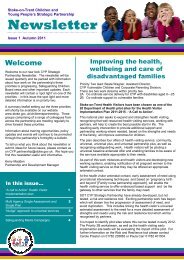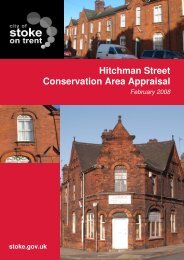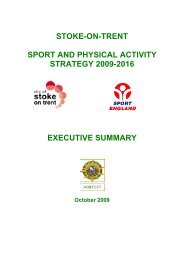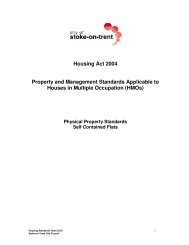Director of Public Health Annual Report 2012 [pdf] - Stoke-on-Trent ...
Director of Public Health Annual Report 2012 [pdf] - Stoke-on-Trent ...
Director of Public Health Annual Report 2012 [pdf] - Stoke-on-Trent ...
Create successful ePaper yourself
Turn your PDF publications into a flip-book with our unique Google optimized e-Paper software.
L<strong>on</strong>g-term c<strong>on</strong>diti<strong>on</strong>s chapter<br />
LTCs are significantly more prevalent am<strong>on</strong>g the more deprived city residents and, as<br />
menti<strong>on</strong>ed earlier, include mental health and cor<strong>on</strong>ary heart disease. In the individual patient<br />
multimorbidity is now the norm rather than the excepti<strong>on</strong>. Management <str<strong>on</strong>g>of</str<strong>on</strong>g> several chr<strong>on</strong>ic<br />
diseases in <strong>on</strong>e patient is the most important challenge facing health and social care<br />
services today. Although multimorbidity is related to age and is comm<strong>on</strong>ly found in the<br />
elderly, there are numerically more people with more than <strong>on</strong>e chr<strong>on</strong>ic c<strong>on</strong>diti<strong>on</strong> under the<br />
age <str<strong>on</strong>g>of</str<strong>on</strong>g> 65.<br />
Prevalence increases with deprivati<strong>on</strong>, to the extent that people in deprived areas have the<br />
same frequency <str<strong>on</strong>g>of</str<strong>on</strong>g> multimorbidity as more affluent patients who are up to 15 years older 13 . In<br />
additi<strong>on</strong>, physical and mental health multimorbidity is almost twice as comm<strong>on</strong> in the most<br />
deprived as in the most affluent areas. These findings are highly relevant to <str<strong>on</strong>g>Stoke</str<strong>on</strong>g>-<strong>on</strong>-<strong>Trent</strong>,<br />
and do much to explain the reduced quality <str<strong>on</strong>g>of</str<strong>on</strong>g> life and worse health outcomes present in the<br />
city’s deprived areas.<br />
Since the populati<strong>on</strong> is ageing and the proporti<strong>on</strong> <str<strong>on</strong>g>of</str<strong>on</strong>g> people with multimorbidity is rapidly<br />
increasing, ever increasing financial pressures are being generated. Therefore, it is clear<br />
that LTCs need to be managed more efficiently. It is also necessary to alter the mindset and<br />
approach <str<strong>on</strong>g>of</str<strong>on</strong>g> practiti<strong>on</strong>ers who are trained to deal with single disease-specific situati<strong>on</strong>s. The<br />
whole patient c<strong>on</strong>cept is essential in order to minimise the expectati<strong>on</strong> for the pers<strong>on</strong> with<br />
several chr<strong>on</strong>ic c<strong>on</strong>diti<strong>on</strong>s to attend several different clinics. The proper co-ordinati<strong>on</strong> <str<strong>on</strong>g>of</str<strong>on</strong>g> care<br />
promotes cost savings, efficiency, effectiveness and patient satisfacti<strong>on</strong>.<br />
This chapter raises further issues that invite comment. There is no agreement <strong>on</strong> definiti<strong>on</strong>.<br />
If musculoskeletal c<strong>on</strong>diti<strong>on</strong>s were included, this would significantly increase the numbers <str<strong>on</strong>g>of</str<strong>on</strong>g><br />
affected people. They are not included in the <str<strong>on</strong>g>Stoke</str<strong>on</strong>g>-<strong>on</strong>-<strong>Trent</strong> data presented. While<br />
hypertensi<strong>on</strong> is shown as the most frequent LTC across the city, other authorities may not<br />
include this c<strong>on</strong>diti<strong>on</strong>. So, for c<strong>on</strong>sistency and comparis<strong>on</strong> purposes, there is clearly a need<br />
to agree <strong>on</strong> definiti<strong>on</strong>. Costs are rightly highlighted but again, <strong>on</strong>ce we have an agreed<br />
definiti<strong>on</strong>, it will be useful to collect and analyse future ec<strong>on</strong>omic data. While NICE guidance<br />
is always useful, it tends to be geared towards disease specific c<strong>on</strong>diti<strong>on</strong>s, whereas what we<br />
need is more <strong>on</strong> multimorbidity. Perhaps we also need to focus more <strong>on</strong> an available and<br />
effective peer support system that can comfort and further inform the patient with LTCs.<br />
This could include the champi<strong>on</strong>s support approach. We require improved recording <str<strong>on</strong>g>of</str<strong>on</strong>g><br />
ethnicity since, as already described, there is an increased prevalence <str<strong>on</strong>g>of</str<strong>on</strong>g> cor<strong>on</strong>ary heart<br />
disease and chr<strong>on</strong>ic liver disease in some minority ethnic groups. It would be useful to have<br />
a detailed audit <str<strong>on</strong>g>of</str<strong>on</strong>g> nursing homes so that the challenges faced by social services could be<br />
better appreciated. Again, an audit <str<strong>on</strong>g>of</str<strong>on</strong>g> hospital admissi<strong>on</strong>s for LTCs should be d<strong>on</strong>e so that<br />
less<strong>on</strong>s can be learnt. We need to identify LTCs much earlier and delay the deteriorati<strong>on</strong> <str<strong>on</strong>g>of</str<strong>on</strong>g><br />
health that removes the patient from an independent existence. Probably an outcomes<br />
based approach could improve earlier detecti<strong>on</strong> and management <str<strong>on</strong>g>of</str<strong>on</strong>g> LTCs. In c<strong>on</strong>clusi<strong>on</strong>,<br />
from the perspective <str<strong>on</strong>g>of</str<strong>on</strong>g> social care and health services, it is clear that we need a resource<br />
shift away from costly instituti<strong>on</strong>al and acute care towards preventi<strong>on</strong>.<br />
59 | P a g e


![Director of Public Health Annual Report 2012 [pdf] - Stoke-on-Trent ...](https://img.yumpu.com/32721490/61/500x640/director-of-public-health-annual-report-2012-pdf-stoke-on-trent-.jpg)














